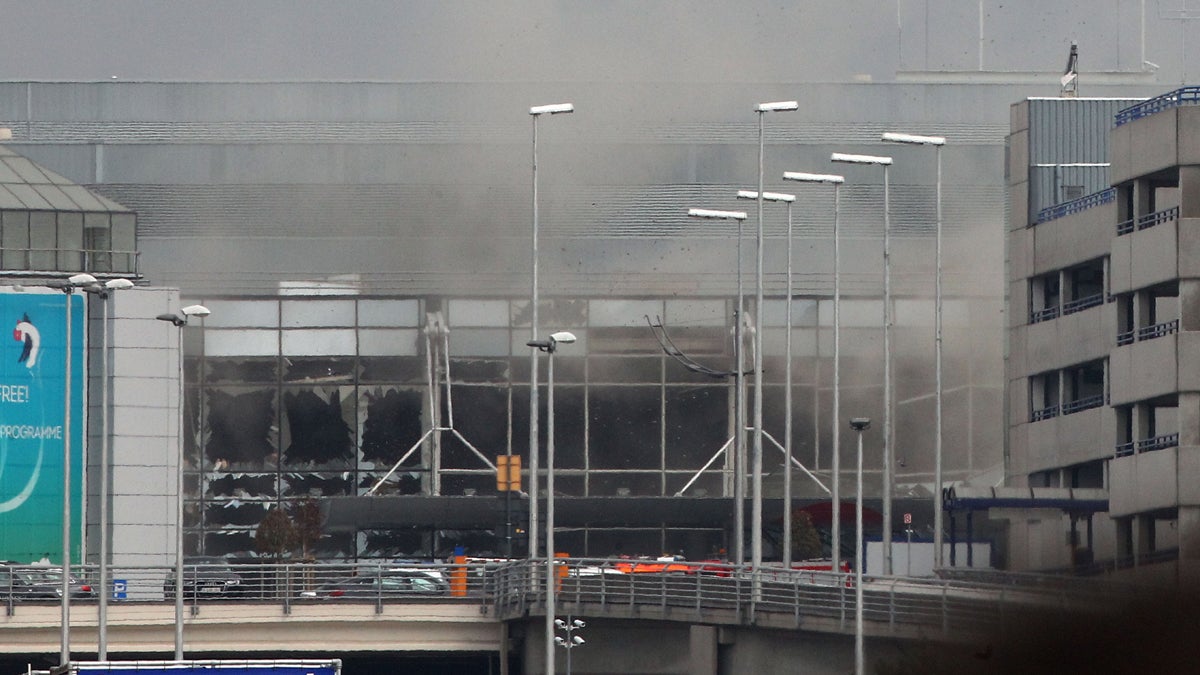The politics of terror in a climate of fear

Smoke billows from the Zaventem Airport after a controlled explosion in Brussels
Every terrorist attack threatens to put Donald Trump one step closer to the White House.
Hey, I could be wrong. Hillary Clinton fans believe that her Situation Room experience will ultimately trump the demagogue if the two candidates square off this autumn on national security issues. They say that most voters, even if shaken by terrorism, will prefer to have a steady seasoned hand at the helm.
Maybe. But fear is a potent political weapon — especially at times like this, with Brussels in the news — and Trump is a master at going for the gut. If more attacks occur in the West between now and election day, he may be well positioned to exploit that fear. He doesn’t know much of anything about policy — this is hideously clear by now; on Monday, he even suggested that we scale down America’s commitment to NATO — but he instinctively understands the visceral power of simplistic language.
Trump and Clinton are still the likeliest fall contenders; the so-called Western Tuesday primaries did not upend the delegate math. Trump inched further ahead in the shrunken Republican field, because his delegate tally in Arizona was bigger than Ted Cruz’s tally in Utah. And on the Democratic side, Clinton and Bernie Sanders essentially split the delegates that were on the table in Arizona, Utah, and Idaho – which leaves Clinton far ahead. Bernie is basically done.
So let’s assume (for now) that the matchup is Trump-Clinton. Here’s what Trump is currently saying about Clinton: “She’s weak on anything having to do with strength.”
Yes, it’s simplistic. Yes, it’s the kind of line that’s written with a crayon. But there’s a method to his madness. He’s working to own the word strong and equate her with the word weak.
He’s been doing this for months, like when he blitzed the Sunday TV shows in early January: “I think that my words represent toughness and strength. Hillary’s not strong. Hillary’s weak.” Which mirrors what he’s saying now: “We have to be tough. We can’t be soft and weak.”
He’s saying this stuff over and over; do not underestimate the power of repetition. As Republican consultant and wordmeister Frank Luntz has reputedly said, “There’s a simple rule (for candidates). You say it again, and you say it again, and you say it again, and you say it again, and you say it again, and then again and again and again and again, and about the first time that you’re absolutely sick of saying it, is about the time that your target audience has heard it for the first time.”
Maybe you think this is just a crock, that Trump’s primal scream and gift for repetition can’t possibly prevail even if autumn swing voters are quaking their boots about terrorism. Maybe you scoff at the notion that swing voters would listen to Trump when he says Clinton is “weak on borders.” (As he did this week.) Maybe you find it funny that Trump has been aspiring to own the strong word since at least 1990 – when he told Playboy magazine that if he were president, he “would believe very strongly in extreme military strength.”
But academics who have studied the impact of terrorism on public opinion – they’re not laughing:
Their research finds that in times of fear, voters become more open to candidates with positions similar to Trump’s, such as hostility to perceived outsiders, tightened borders and fewer foreign entanglements.
“All of these issues are, in fact, pillars of the aggressive response we have seen by Donald Trump in response to the news today,” said Elizabeth J. Zechmeister, a political science professor at Vanderbilt University. She is the co-author, with University of California Riverside professor Jennifer L. Merolla, of the book “Democracy at Risk: How Terrorist Threats Affect the Public.”
In a cautionary note for Democrats, Merolla said that their research showed that frightened voters do not necessarily look for traditional leadership qualities such as Clinton’s long tenure in government. She added that female politicians “are typically at a disadvantage” when terrorism is a dominant issue.
It’s quite possible that Trump’s baggage will ultimately defeat him, that fear of his ascent will trump his attempts to exploit fear of terrorism. Distaste for the guy still runs high even in Republican circles. Yesterday, after Trump threatened in a tweet to smear Ted Cruz’s wife (don’t ask), former George W. Bush speechwriter Michael Gerson posted this appeal to his GOP brethren: “How could anyone, anyone, support this vile man….If Trump were somehow, God forbid, to be elected president, he would immediately defile the office, and surely abuse it.”
Fine. But never underestimate the power of fear as a voting motivation – especially in a climate like ours. History has taught us, all too often, what can happen when the basest instincts of human nature lead people astray.
I’m reminded of something that Bill Clinton said in December 2002, during a speech I covered in New York. He framed it as a warning to his fellow Democrats: “If we look ‘weak’ at a time when people are scared, we lose. Insecure people would rather have someone who is ‘strong’ and wrong.”
——-
Follow me on Twitter, @dickpolman1, and on Facebook.
WHYY is your source for fact-based, in-depth journalism and information. As a nonprofit organization, we rely on financial support from readers like you. Please give today.

